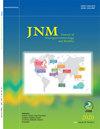Do Proton Pump Inhibitor-refractory Laryngeal Symptoms Represent a True Acid-related Disease?
IF 3.3
3区 医学
Q2 CLINICAL NEUROLOGY
引用次数: 0
Abstract
c 2023 The Korean Society of Neurogastroenterology and Motility J Neurogastroenterol Motil, Vol. 29 No. 3 July, 2023 www.jnmjournal.org Gastroesophageal reflux disease (GERD) is a condition characterized by regurgitation of stomach contents into the esophagus or mouth, leading to troublesome symptoms or complications. Globally, the overall burden of GERD has continued to worsen. The number of prevalent cases increased by 77.53% from 441.57 million in 1990 to 783.95 million in 2019. A systematic review conducted in Asia in 2011 revealed an increasing prevalence of symptom-based GERD in Eastern Asia: 2.5-4.8% before 2005 and 5.2-8.5% between 2005 and 2010. Moreover, this study found that extraesophageal symptoms were more common in patients with GERD than in healthy individuals. Laryngopharyngeal reflux (LPR) is an extraesophageal manifestation of GERD. It refers to the reflux of gastric contents into the larynx, causing symptoms such as throat clearing, hoarseness, pain, globus sensation, coughing, excessive mucus in the throat, and dysphonia. However, no gold standard currently exists for the diagnosis and treatment of LPR, which presents a challenge to health-care systems. In a study published in this issue, Tseng et al focused on examining the physiological and clinical characteristics of patients who experienced laryngeal symptoms despite receiving empirical proton pump inhibitor (PPI) therapy for an adequate duration. The authors not only investigated typical reflux symptoms but also considered comorbidities such as sleep disturbances and other psychological problems. According to several studies about the correlation between LPR and anxiety, depressive disorders, or insomnia, PPI-unresponsive laryngeal symptoms may be associated with psychological factors and sleep disturbances. In a study conducted in South Korea in 2022, the association between LPR and insomnia was investigated using multiple intraluminal impedance-pH (MIIpH) monitoring and a questionnaire survey (Insomnia Severity Index questionnaire). The results of that study are consistent with the findings of the current study. Tseng et al used various multidisciplinary assessment tools, including the 5-item Brief Symptom Rating Scale and the Pittsburgh Sleep Quality Index, to obtain objective information from patients and healthy asymptomatic individuals. However, it is difficult to generalize the study results because of the single-center design and lack of a cause-effect relationship. Moreover, a concern exists that endoscopy and MII-pH monitoring may not be adequate for evaluating patients with extraesophageal symptoms suggestive of LPR, as indicated in a previous study. LPR remains a challenging issue in clinical practice because JNM J Neurogastroenterol Motil, Vol. 29 No. 3 July, 2023 pISSN: 2093-0879 eISSN: 2093-0887 https://doi.org/10.5056/jnm23074 Editorial Journal of Neurogastroenterology and Motility质子泵抑制难治性喉部症状是一种真正的酸相关疾病吗?
本文章由计算机程序翻译,如有差异,请以英文原文为准。
求助全文
约1分钟内获得全文
求助全文
来源期刊

Journal of Neurogastroenterology and Motility
GASTROENTEROLOGY & HEPATOLOGY-CLINICAL NEUROLOGY
CiteScore
6.30
自引率
8.80%
发文量
96
期刊介绍:
Journal of Neurogastroenterology and Motility (J Neurogastroenterol Motil) is a joint official journal of the Korean Society of Neurogastroenterology and Motility, the Thai Neurogastroenterology and Motility Society, the Japanese Society of Neurogastroenterology and Motility, the Indian Motility and Functional Disease Association, the Chinese Society of Gastrointestinal Motility, the South East Asia Gastro-Neuro Motility Association, the Taiwan Neurogastroenterology and Motility Society and the Asian Neurogastroenterology and Motility Association, launched in January 2010 after the title change from the Korean Journal of Neurogastroenterology and Motility, published from 1994 to 2009.
 求助内容:
求助内容: 应助结果提醒方式:
应助结果提醒方式:


